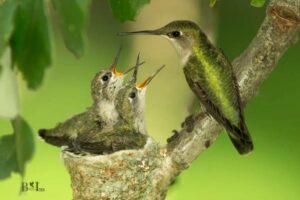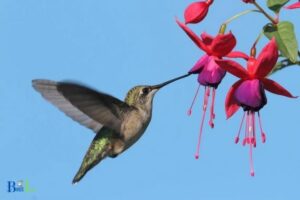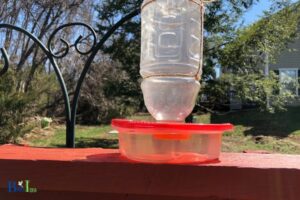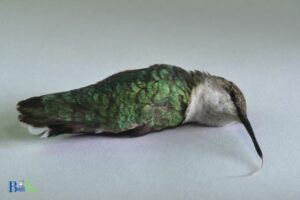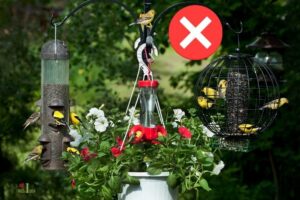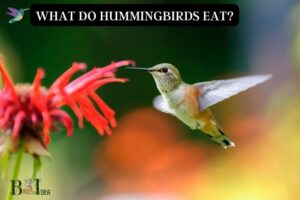Do Raccoons Eat Hummingbird Food? Yes!
Yes, raccoons do eat hummingbird food. They are opportunistic feeders known to raid hummingbird feeders for the sweet nectar inside.
Raccoons are omnivorous animals with a varied diet that can adapt to different food sources in their environment.
They are particularly attracted to sugary substances, which makes hummingbird feeders prime targets.
Since raccoons are nocturnal, they often feed at night when hummingbirds are not active, reducing the availability of nectar for the birds.
Here are a few reasons why raccoons are drawn to hummingbird food:
- High sugar content is a quick energy source.
- Feeders are often easily accessible.
- Raccoons have dexterous paws that allow them to manipulate feeders.
To deter raccoons, secure hummingbird feeders with raccoon-proof poles or baffles and bring feeders indoors at night.
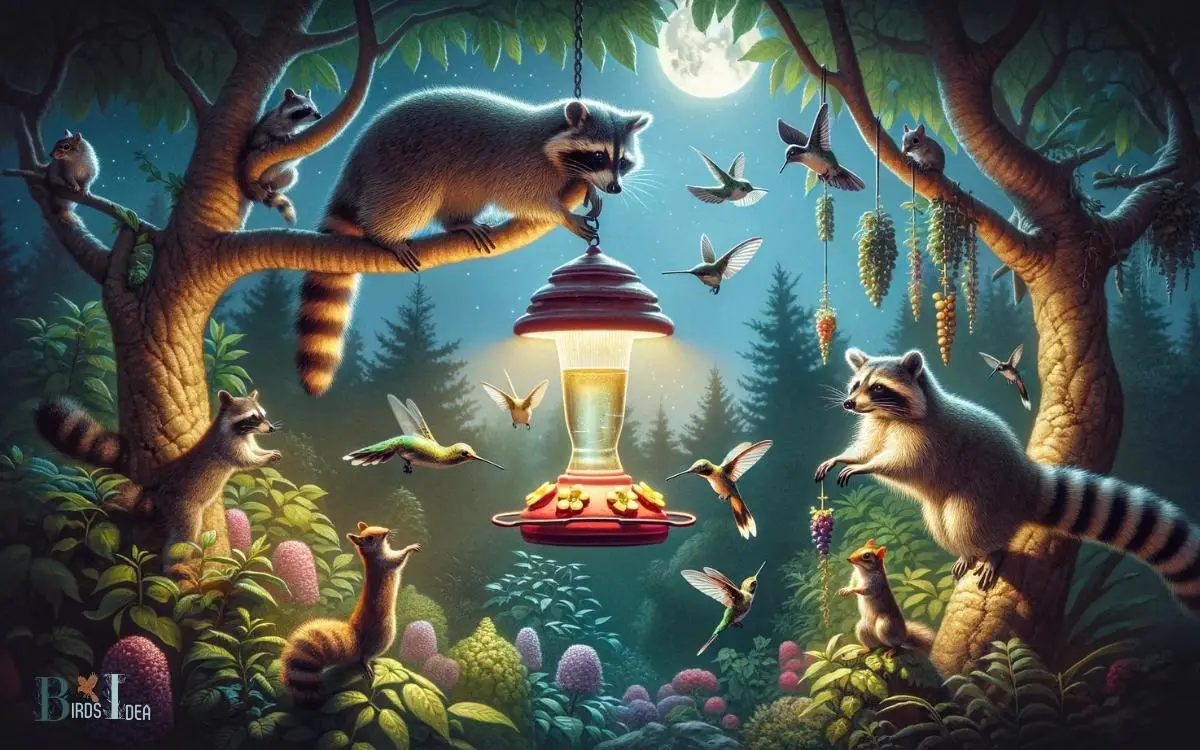
Key Takeaway
Raccoon Behavior and Diet
Raccoon diet and behavior play a significant role in understanding their interaction with hummingbird food sources.
Raccoons are omnivorous creatures known for their opportunistic feeding habits, consuming a wide variety of foods including fruits, nuts, insects, and small animals.
Their adaptability and dexterity enable them to raid bird feeders and forage for food in gardens, making hummingbird food within their range of interest.
Raccoons are also nocturnal, which means they are most active during the night when hummingbirds are at rest.
This behavior increases the likelihood of raccoons coming into contact with hummingbird feeders.
Understanding the behavior and dietary preferences of raccoons is essential for implementing effective strategies to protect hummingbird food sources from these opportunistic foragers.
Hummingbird Food Attraction
Attracting hummingbirds with food can also inadvertently attract raccoons, as they are opportunistic feeders that may raid bird feeders for the sweet nectar.
It’s important to consider ways to prevent wildlife feeding, such as using raccoon-proof bird feeders or placing feeders in locations that are less accessible to raccoons.
Understanding the potential attraction of hummingbird food to raccoons can help in devising effective strategies for coexisting with wildlife.
Raccoons and Bird Feeders
Hummingbird food in bird feeders may inadvertently attract raccoons, posing a potential challenge for both bird enthusiasts and homeowners.
Raccoons are opportunistic feeders and will readily consume the sweet nectar meant for hummingbirds.
This can lead to damage to bird feeders and create a mess in outdoor spaces. To address this issue, it’s important for individuals to consider raccoon-resistant bird feeder designs and placement strategies.
Additionally, implementing humane raccoon deterrent methods can help minimize their presence around bird feeding areas.
Here is a table summarizing effective strategies for preventing raccoons from accessing bird feeders:
| Strategy | Description |
|---|---|
| Raccoon-resistant feeder designs | Utilize feeders with mechanisms that deter raccoons from accessing the food. |
| Strategic feeder placement | Position feeders in locations that are challenging for raccoons to reach. |
| Humane deterrent methods | Implement non-harmful techniques to discourage raccoons from approaching the feeders. |
Preventing Wildlife Feeding
Prevention of wildlife feeding, particularly in relation to sweet nectar meant for birds, necessitates strategic measures to deter opportunistic feeders from accessing and consuming the intended food sources.
To effectively prevent wildlife feeding and the attraction of unwanted animals to hummingbird food, consider the following measures:
- Secure bird feeders at night to prevent access by nocturnal animals.
- Use specialized bird feeders designed to deter large or nuisance animals.
- Clean up any spilled or excess nectar to avoid attracting wildlife to the area.
- Install motion-activated lights or sound devices to startle and deter animals from approaching the feeding area.
Nighttime Feeding Habits
Raccoons are primarily nocturnal animals, and their nighttime feeding habits can have a significant impact on birdfeeding routines, including the consumption of hummingbird food.
Their foraging behavior often leads them to seek out easily accessible sources of food, which may include bird feeders.
Implementing prevention methods can help deter raccoons and other wildlife from disrupting the feeding patterns of birds that rely on these resources.
Raccoon Nocturnal Behavior
How do raccoons behave at night when it comes to their feeding habits? Raccoons are primarily nocturnal creatures, and their nighttime behavior often revolves around finding food.
Here are some key nocturnal feeding habits of raccoons:
- Foraging: Raccoons are active foragers at night, using their keen sense of smell and nimble paws to root through trash cans, gardens, and compost piles in search of food.
- Hunting: They are opportunistic hunters and will prey on small animals such as birds, eggs, insects, and small mammals under the cover of darkness.
- Scavenging: Raccoons are known scavengers and will scavenge for leftovers from outdoor pet food bowls, unsecured garbage, and even bird feeders.
- Feeding on natural resources: In their natural habitat, raccoons will feed on fruits, nuts, and aquatic creatures like crayfish and frogs that are more active at night.
Impact on Birdfeeding Habits
During their nocturnal activities, raccoons can have an impact on birdfeeding habits, particularly through their foraging, hunting, and scavenging behaviors.
| Impact on Birdfeeding Habits | Description |
|---|---|
| Foraging | Raccoons may disrupt birdfeeding habits by rummaging through bird feeders, causing spills and scaring off birds. |
| Hunting | Raccoons are opportunistic hunters and may prey on small birds or bird eggs, affecting bird populations. |
| Scavenging | Raccoons are attracted to leftover bird food or fallen seeds, leading to competition with birds for limited food resources. |
The nighttime activities of raccoons can disturb the peaceful and natural birdfeeding habits. This impact highlights the importance of implementing prevention methods for deterring wildlife from disrupting birdfeeding activities.
Prevention Methods Foraging Wildlife
The disturbance caused by nocturnal foraging wildlife, particularly raccoons, on birdfeeding habits necessitates the implementation of effective prevention methods.
To protect the feeding habits of birds, especially hummingbirds, consider the following prevention methods:
- Secure Feeders: Use baffles or cones on poles to prevent raccoons from climbing up to the feeders.
- Use Motion-Activated Lights or Sprinklers: Install lights or sprinklers that are triggered by motion to deter raccoons from approaching the feeding area.
- Remove Food Sources: Keep the surrounding area clean by removing fallen seeds or food scraps that may attract raccoons.
- Consider Timed Feeding: Set up feeding schedules to ensure that bird feeders are only accessible during the day when raccoons are less active.
Risks to Hummingbirds
Raccoons pose a significant risk to hummingbirds due to their predatory nature and their ability to raid hummingbird feeders for food.
These clever and dexterous creatures can easily access feeders, potentially harming or scaring off the delicate hummingbirds.
Raccoons may disturb nesting areas, causing stress to the hummingbirds and potentially leading to abandoned nests.
It is crucial for individuals who provide hummingbird feeders to be aware of these risks and take measures to protect the hummingbirds from raccoon interference.
| Risk Factor | Impact | Prevention |
|---|---|---|
| Feeder Raiding | Harms hummingbirds, causes stress | Use raccoon-proof feeders |
| Nest Disturbance | Potential abandonment of nests | Install nesting boxes in safe locations |
| Predatory Behavior | Endangers hummingbirds | Remove potential food sources for raccoons |
Deterrent Methods
To effectively deter raccoons from accessing hummingbird feeders, consistently employing appropriate deterrent methods is essential.
Consider the following methods to protect the feeders and ensure the safety of the hummingbirds:
- Use a baffle: Install a baffle on the pole supporting the feeder to prevent raccoons from climbing up.
- Secure the feeder: Ensure the feeder is securely attached to the pole or hanging apparatus to prevent raccoons from knocking it down.
- Motion-activated lights or sprinklers: Install motion-activated lights or sprinklers near the feeder to startle raccoons and deter them from approaching.
- Remove food sources: Keep the surrounding area clean and remove any potential food sources that might attract raccoons, such as fallen seeds or fruits.
Can Raccoons and Hummingbirds Compete for the Same Food Source?
While raccoons and hummingbirds typically have diverse diets, there might be instances of hummingbirds fighting for food with resourceful raccoons. Due to their flexible eating habits, raccoons may occasionally snatch nectar or raid hummingbird feeders, leading to competition over limited food sources. This dynamic highlights the adaptability and persistence of both animals as they navigate their surroundings.
Feeder Placement Tips
For optimal effectiveness in deterring raccoons, it is essential to frequently reassess the placement of hummingbird feeders.
When considering feeder placement, it is crucial to ensure that they are located in areas that are difficult for raccoons to access.
Hanging feeders from long hooks or thin poles can prevent raccoons from reaching them. Additionally, placing feeders in well-lit areas can dissuade raccoons from approaching.
It’s also advisable to avoid placing feeders near overhanging branches or structures that raccoons can use to gain access.
Regularly inspecting the placement and making adjustments as needed can help maintain a raccoon-free environment for hummingbirds to feed.
These simple feeder placement tips can significantly reduce the likelihood of raccoons accessing hummingbird food.
Conclusion
Raccoons are opportunistic feeders and may be attracted to the sweet nectar in hummingbird feeders.
This poses a potential risk to hummingbirds as they compete for food sources. To deter raccoons, feeder placement and deterrent methods are essential.
Like a dance between predator and prey, finding a balance in feeder placement and using effective deterrent methods is crucial to ensuring the safety and well-being of hummingbirds.

